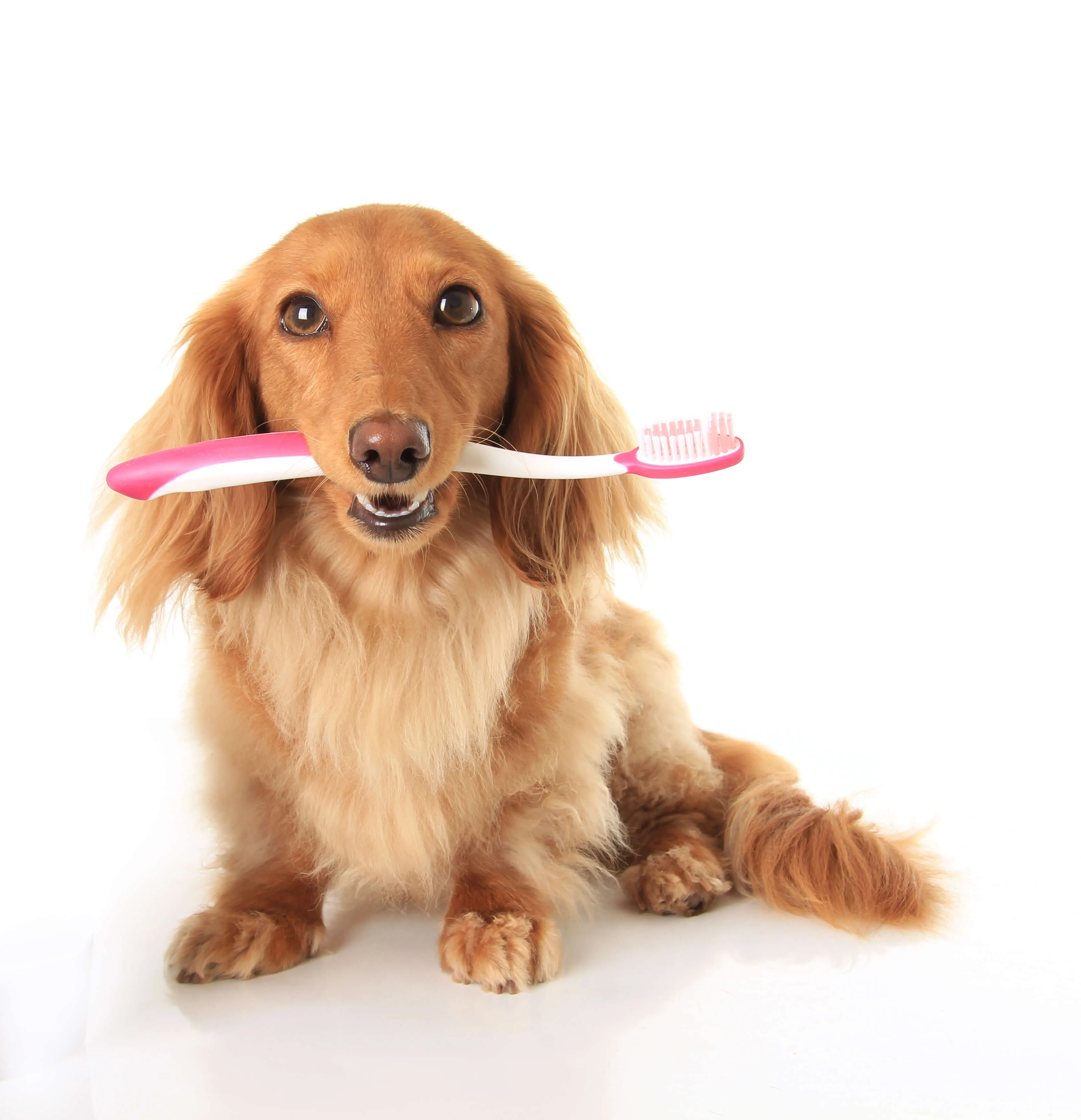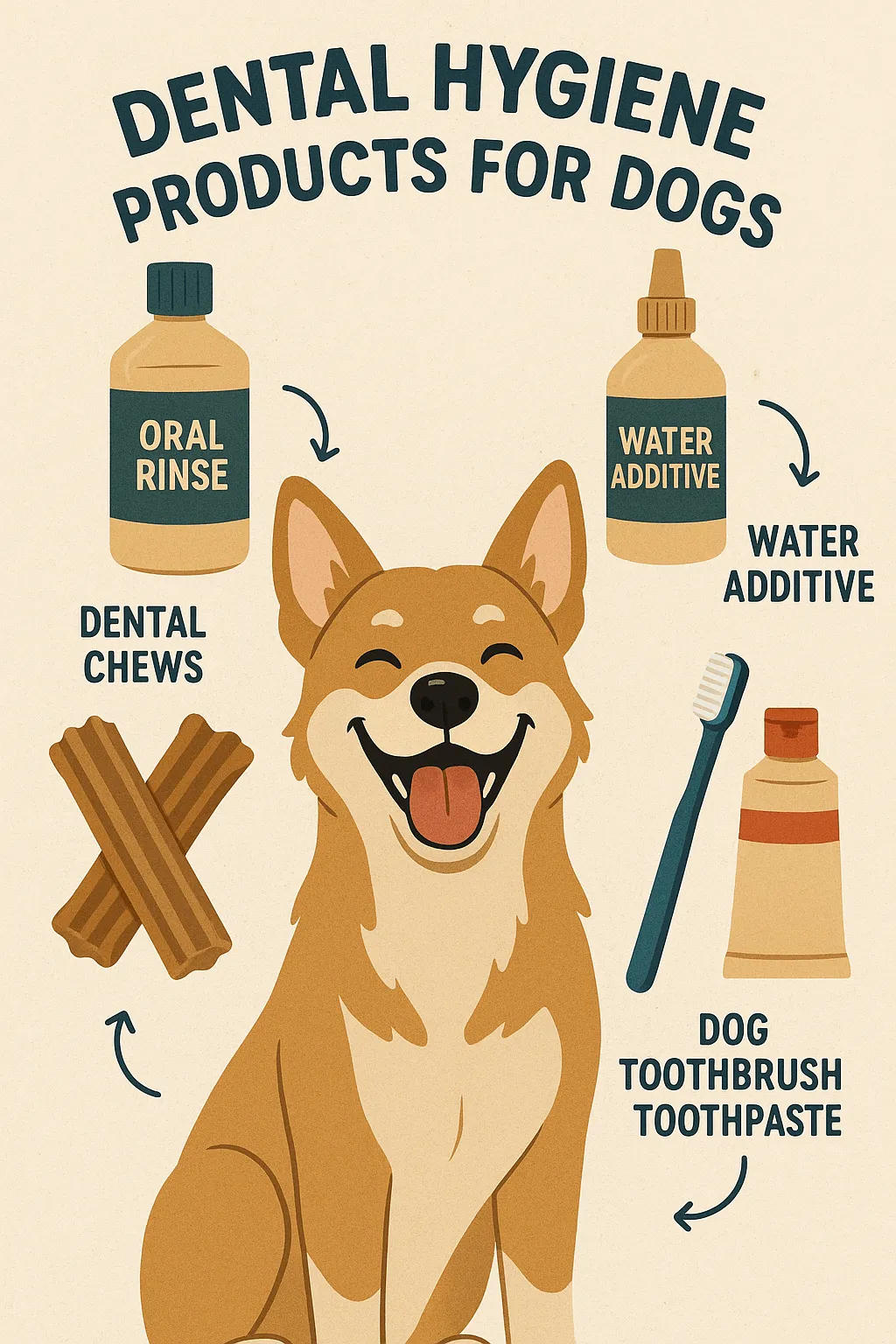Many dog parents regularly brush their dog’s teeth to promote good oral hygiene, but did you know that specialized dog dental products can also support fresh breath, clean teeth, and healthy gums? This article will explore the benefits of these products, the dangers of homemade and human mouthwash for dogs, and how to choose the right oral rinse, dental chews, or water additive to keep your pup’s smile sparkling clean. Maintaining your dog’s oral health is crucial for their overall well-being, as dental issues can lead to more severe health problems. Ensuring proper dental care, including understanding options like pets at home dog mouthwash, is a vital part of responsible pet ownership.
Understanding Dog Dental Hygiene Products: Purpose and Key Ingredients
Just like with human oral care, the primary purpose of doggy dental hygiene products is to combat bad breath, target hard-to-reach areas of the mouth, and support healthy teeth and gums. Many pet owners incorporate these products into their daily routine to help maintain their pup’s dental hygiene and keep their adorable smiles healthy. These specialized solutions are formulated to be safe for dogs, unlike human products that can be harmful if ingested.
A diverse range of ingredients can be found in dog dental hygiene products, with specific components often varying between oral rinses, sprays, and water additives. Some of the most common and effective ingredients include:
- Chlorhexidine gluconate: Frequently found in oral rinses, chlorhexidine helps freshen breath, combat tartar, and promotes overall good dental hygiene. Its antiseptic properties are highly beneficial for gum health.
- Stabilized chlorine dioxide: This agent is adept at neutralizing the volatile sulfur compounds that are the primary cause of bad breath in dogs, leading to a noticeably fresher scent.
- Zinc salts (e.g., zinc gluconate): These zinc-containing ingredients play a crucial role in controlling tartar build-up on the teeth, actively contributing to better oral health.
- Cetylpyridinium chloride: Similar to human dental products, this ingredient effectively tackles both bad breath and the accumulation of tartar.
- Sodium citrate: This ingredient specifically targets the formation of tartar on the teeth, helping to prevent its hardening into calculus.
Dog breath freshening products, such as water additives and oral rinses, which serve as a dog-friendly alternative to human mouthwash, are often flavorless. They commonly include inactive ingredients like water and glycerin to ensure palatability and ease of use. Ongoing research continues to explore the full benefits and potential risks of various ingredients in dog dental products. It is always important to monitor your pup closely when introducing any new element to their dental care routine, especially for very young puppies under 12 weeks old, as many products are not suitable for them.
Types of Dog Dental Products to Freshen Breath
Humans use mouthwash by swishing a liquid around their mouth and then spitting it out. Our canine companions, however, won’t follow such instructions, which means that any breath-freshening product for dogs must be safe for them to swallow. This essential difference has led to the development of several specialized forms of breath-freshening dog dental products:
- Oral Rinses: These liquid solutions are typically squirted directly into your dog’s mouth. While some liquid may naturally exit the mouth, a significant portion is swallowed, allowing the active ingredients to work throughout the oral cavity.
- Breath-Freshening Sprays: Applied by spritzing directly into the dog’s mouth, these sprays are designed to be redistributed by the dog’s natural licking and salivating motions. This ensures the active ingredients reach all surfaces of the teeth and gums.
- Water Additives: Often the easiest to administer, dental water additive for dogs and cats can simply be added to your pup’s water bowl. These flavorless solutions don’t require direct application, making them a stress-free option for many pet owners. They function similarly to mouthwash, effectively supporting fresh breath and a clean mouth with minimal effort. This is an excellent option for busy pet parents or dogs that are sensitive to direct oral application.
 Dog with toothbrush, clean dog teeth
Dog with toothbrush, clean dog teeth
Do Dog Dental Products Really Work?
Dog dental products are designed to freshen breath and reach areas of the mouth that are challenging to access with a traditional toothbrush. These hard-to-reach spots include the spaces between teeth, the tongue-facing sides of teeth, and the teeth located in the very back of the mouth. While many dog dental products contain ingredients that help reduce tartar build-up, they should always be used as a supplement to regular tooth brushing. You should still brush your dog’s teeth daily or at least several times a week to ensure their smile remains as tartar-free as possible.
It’s important to remember that if your dog exhibits existing dental issues, such as severe plaque, gingivitis, or loose teeth, consulting a veterinarian is paramount. A professional dental cleaning performed by a vet is the most effective way to address pre-existing dental problems and prevent further complications. Dog dental products are primarily preventative and supportive, not curative for advanced conditions. They are an excellent tool for maintaining fresh breath for dogs water and overall oral health.
The Dangers of Human Mouthwash for Dogs
You should never give your Dog Mouthwash that is formulated for human use. Human mouthwash is specifically designed to be swished around the mouth for a period and then spit out. Because it is not intended for ingestion, human mouthwash often contains ingredients that can be toxic or harmful to dogs if swallowed, even in relatively small quantities.
Several common ingredients found in human mouthwash can pose serious risks to your dog:
- Ethanol: Alcohol, even in small amounts, can cause alcohol poisoning in dogs, leading to symptoms like vomiting, disorientation, and even central nervous system depression.
- Xylitol: This sugar substitute is highly toxic to dogs. Ingestion can cause a rapid and significant release of insulin, leading to a sudden drop in blood sugar (hypoglycemia), which can be life-threatening. Symptoms can include vomiting, lethargy, loss of coordination, seizures, and liver failure.
- Fluoride: While beneficial for human teeth in small doses, fluoride can be toxic to dogs if ingested in larger amounts, causing gastrointestinal upset, weakness, and in severe cases, cardiac issues.
If your dog were to accidentally ingest human mouthwash, the following symptoms could occur:
- Vomiting
- Diarrhea
- Weakness or lethargy
- Seizures (in severe cases due to xylitol toxicity)
- Death (in severe cases)
In addition to potential toxins, human mouthwashes frequently include ingredients that are unpalatable or irritating to dogs, such as menthol, which can cause discomfort. If you suspect your dog has consumed human mouthwash, contact your veterinarian or a pet poison helpline immediately. Time is critical in such situations.
 Infographic detailing dog dental hygiene products
Infographic detailing dog dental hygiene products
How to Effectively Use Breath-Freshening Products for Dogs
The closest equivalent to human mouthwash for a dog is a specialized breath-freshening product like an oral rinse, spray, or water additive. When using any doggy breath freshener, always follow the specific instructions provided on the product packaging. These guidelines are crucial for efficacy and safety.
- Water additives typically specify the precise amount to add to a certain volume of water. For instance, a common recommendation might be one teaspoon (5 mL) mixed into 8 ounces of water, to be given once daily to help freshen breath. This method is often the easiest for pet owners.
- Dog mouth sprays will provide directions on where to spray the product and how frequently. Instructions might advise spraying twice daily on the teeth and gums on each side of the mouth, ensuring even distribution.
- For oral rinses, an example instruction might be to apply a gentle stream along the gumline daily after each meal, allowing the solution to coat the teeth and gums.
If your veterinarian recommends a particular product, always prioritize and follow their instructions, as they are tailored to your dog’s specific health needs. It’s generally a good practice to consult with your veterinarian when selecting any new dental product for your pet. Remember, dog dental chews for bad breath can also be a useful addition to this routine.
Consider these important precautions when using dog dental products:
- Adhere to Dosage: Never exceed the instructed amount of the product. Overuse can potentially lead to adverse effects due to excessive consumption of certain ingredients.
- Monitor for Reactions: If you are concerned your dog has consumed too much of a dog dental product, or if they show any unusual symptoms, contact your veterinarian or a pet poison helpline without delay.
- Prevent Injury: Keep applicator tips away from your dog’s teeth and gums. If your dog suddenly moves or jerks during application, they could sustain an injury from the applicator.
- Consider Other Pets: Products suitable for dogs may not be safe or intended for other types of pets in the household. Always check product compatibility for all your animals.
- Avoid Homemade Solutions: While tempting, there is insufficient scientific evidence to support the safety or effectiveness of homemade dog mouthwashes. It is always better to use commercially available dental products specially formulated and tested for dogs.
A professional veterinary dental check-up is a critical part of maintaining your dog’s oral health.
Comprehensive Dental Health Care for Your Dog
Maintaining your pet’s dental health requires a multifaceted approach, with regular professional dental cleanings and veterinary check-ups forming the cornerstone. For young adult dogs, annual wellness check-ups are typically recommended. For senior dogs, wellness exams may be advised twice a year, reflecting their increased susceptibility to health issues. During these appointments, as long as your dog tolerates oral examinations without posing a risk to veterinary staff, they should receive a thorough oral health assessment. This includes checking for signs of plaque, tartar, gum disease, and other dental abnormalities.
Beyond professional care, daily home dental hygiene is essential. Brushing your dog’s teeth with pet-safe toothpaste at least three times a week will significantly help prevent the accumulation of plaque, which, if left untreated, hardens into dental calculus. Ideally, brushing your dog’s teeth once daily is the most effective way to promote a healthy, clean mouth and truly fresh breath. This consistent effort can drastically reduce the need for more intensive dental interventions later on.
Dog dental hygiene products, such as oral rinses (the dog equivalent of human mouthwash), dental chews that physically scrub at the teeth as your dog chews, and dental powders designed to target tartar even in hard-to-reach places, can be effectively used in conjunction with toothbrushing. These supplementary products enhance the overall dental care regimen, contributing to better oral health outcomes. Consider options like best raw bones for cleaning dogs teeth as a natural supplement, but always supervise their use.
Are Dog Dental Products Right For Your Pup?
If your primary goal is to keep your four-legged best friend’s breath fresh and diligently look after their dental hygiene, specially formulated dog dental care products can be incredibly helpful. The closest equivalent to a traditional mouthwash for a dog is a breath-freshening product designed to support the maintenance of fresh breath and good oral hygiene. These products should be viewed as one vital component of your dog’s comprehensive dental care regimen, working in harmony with daily toothbrushing and regular veterinary dental cleanings and check-ups.
Always ensure you follow your veterinarian’s instructions or the product’s listed directions precisely when incorporating any new dog dental product into your pup’s routine. If you have any concerns that your dog might have an underlying dental health issue, it is imperative to consult your veterinarian before introducing new dental products, as an existing condition might require professional medical attention rather than a home-care solution.
A healthy dog is a happy dog, and good dental hygiene contributes significantly to their overall well-being.
